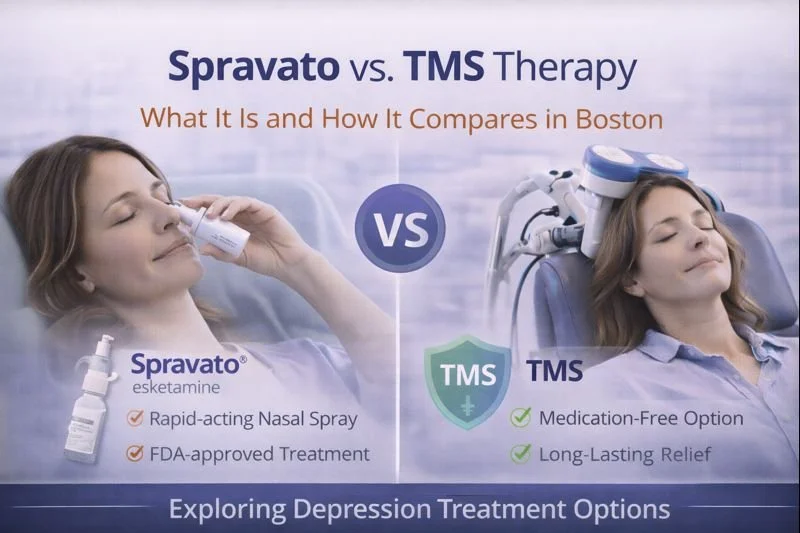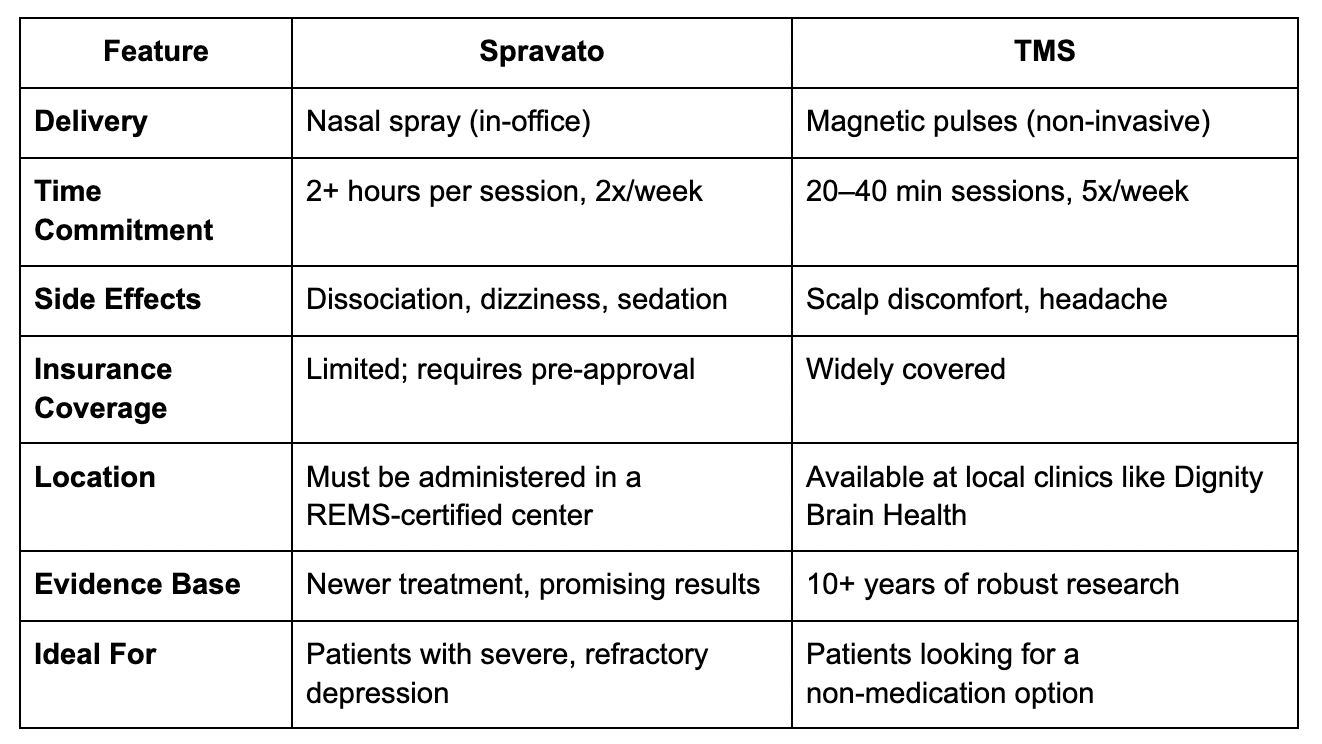Spravato (Esketamine): What It Is and How It Compares to TMS Therapy in Boston
Welcome to Your Guide to Spravato vs. TMS for Depression in Boston
Living with treatment-resistant depression in Boston or nearby areas like Brookline, Cambridge, or Newton? You’re not alone—and you have options. Two innovative treatments are transforming how we approach depression: Spravato (esketamine) and Transcranial Magnetic Stimulation (TMS).
At Dignity Brain Health, we specialize in TMS therapy in Brookline, MA, conveniently located for patients from Somerville, Back Bay, and across the Greater Boston area. In this blog, we’ll break down the key differences between Spravato and TMS, discuss their benefits and side effects, and help you understand which might be right for you.
What Is Spravato (Esketamine)?
Spravato is the brand name for esketamine, a groundbreaking antidepressant approved by the U.S. Food and Drug Administration (FDA) in 2019 specifically for treatment-resistant depression (TRD). Unlike oral antidepressants, which can take weeks to build up in your system, Spravato offers a fast-acting alternative designed to bring relief within hours or days.
This medication is administered as a nasal spray in a certified clinical setting like a psychiatric office or specialty mental health clinic. Each session typically lasts around two hours and includes post-dose monitoring for side effects.
Spravato represents a new frontier in depression treatment—especially for patients who haven’t found relief through standard antidepressants like SSRIs or SNRIs. It’s now a valuable option for people who are seeking innovative, science-backed mental health care.
How It Works
Spravato is a chemical cousin of ketamine, a medication originally used as an anesthetic. But its value in mental health comes from its ability to target the brain’s glutamate system, which plays a crucial role in neural plasticity, learning, and mood regulation.
Most traditional antidepressants work by affecting serotonin, dopamine, or norepinephrine. Esketamine is different: it acts on NMDA receptors, triggering a surge in glutamate that helps restore synaptic connections in areas of the brain affected by depression.
Research suggests this glutamate “burst” can rapidly reduce depressive symptoms, often within hours to days—especially in individuals with severe or suicidal symptoms (Canuso et al., 2018). This fast action can be life-changing for people in crisis who can’t wait for slower-acting medications to take effect.
Who It's For
Spravato is designed for patients who meet the criteria for treatment-resistant depression, meaning they’ve tried two or more antidepressants at an adequate dose and duration without meaningful improvement.
You may be a candidate for Spravato if:
🧠 You’ve experienced persistent depressive symptoms despite multiple medication trials.
⚠️ You have acute or severe depression that significantly impairs your daily life, relationships, or work.
👨⚕️ You are currently under the care of a mental health provider and need advanced treatment options.
🚫 You are not pregnant or breastfeeding, and don’t have a history of substance use disorder or uncontrolled hypertension (these are medical exclusions your provider will screen for).
What Is TMS Therapy?
Transcranial Magnetic Stimulation (TMS) is a non-invasive, drug-free therapy for depression that uses targeted magnetic pulses to stimulate areas of the brain associated with mood. TMS has been FDA-cleared since 2008 for adults with major depressive disorder who have not responded to at least one antidepressant.
Unlike Spravato or traditional medications, TMS does not involve systemic drugs—it works directly on the brain’s neural circuits, using a safe, external device. At Dignity Brain Health in Brookline, our TMS services are led by experts trained in personalized care protocols tailored to your needs.
TMS has been shown to benefit many Boston-area patients from Somerville to Newton who are looking for options that are both evidence-based and free from medication side effects.
How It Works
TMS therapy is simple, painless, and highly targeted. Here's what a typical session looks like:
You relax in a comfortable chair—no need for anesthesia or sedation.
A small magnetic coil is placed gently against your scalp, typically near your left prefrontal cortex.
The device emits repetitive magnetic pulses (rTMS) that pass through your skull and activate neurons in areas linked to mood regulation.
The entire session takes around 20–40 minutes, depending on the protocol. Treatments are usually done 5 days per week for 4–6 weeks, with a tapering schedule afterward.
Key Benefits of TMS
TMS offers a range of benefits that make it an appealing option for many patients in the Boston metro area:
✅ Non-invasive: No medications, no needles, no sedation.
🚫 No systemic side effects: Unlike antidepressants, TMS doesn’t cause weight gain, sexual dysfunction, or fatigue.
🏥 Insurance-friendly: Covered by most major insurers in Massachusetts, including Blue Cross Blue Shield, Harvard Pilgrim, and Tufts Health Plan.
🔬 Clinically effective: Numerous studies confirm that TMS significantly reduces depressive symptoms in patients who haven’t responded to medication.
A multisite observational study found that approximately 58% of patients responded to TMS therapy, with 37% achieving full remission (Carpenter et al., 2012). These results make TMS a well-established option in clinical psychiatry.
TMS is especially suitable for people who:
Want to avoid medication side effects
Prefer a non-pharmacological treatment
Have a history of medication intolerance
Are looking for a long-term solution without daily pills
Whether you’re commuting from Back Bay or working in Cambridge, our Brookline location offers easy access to one of the most effective depression treatments available today.
Spravato vs. TMS: A Head-to-Head Comparison
Let’s break it down.
Why Choose Dignity Brain Health in Brookline, MA?
If you live in Cambridge, Newton, Somerville, or the Back Bay, Dignity Brain Health is your nearby partner in evidence-based, compassionate depression care.
Here’s What Sets Us Apart:
Expert-led TMS therapy programs
Convenient access from MBTA Green Line and commuter routes
Partnership with local institutions like Mass General Hospital and McLean Hospital
A warm, welcoming environment that treats you like a whole person—not just a diagnosis
👉 Explore our TMS therapy services here
Directions to Our Brookline Clinic
📍 Conveniently located near:
✅ Boston, Cambridge, Newton, Alston, Somerville, & Back Bay
Dignity Brain Health - TMS Therapy Clinic―
Additional Resources for Depression Care in Boston
For mental health emergencies, contact the Boston Emergency Services Team (BEST) at 1-800-981-4357.
Take the Next Step Toward Healing
If you’re navigating depression and unsure about your options, don’t wait. Our Brookline-based team is here to guide you through every step—from insurance verification to personalized treatment planning.
💬 Leave a comment below with your questions
📅 Book a free consultation today to learn if TMS is right for you
📞 Or call us directly at (617) 855-7288
References
Canuso, C. M., Singh, J. B., Fedgchin, M., Alphs, L., Lane, R., Lim, P., Pinter, C., Hough, D., Sanacora, G., Manji, H., & Drevets, W. C. (2018). Efficacy and Safety of Intranasal Esketamine for the Rapid Reduction of Symptoms of Depression and Suicidality in Patients at Imminent Risk for Suicide: Results of a Double-Blind, Randomized, Placebo-Controlled Study. The American journal of psychiatry, 175(7), 620–630. https://doi.org/10.1176/appi.ajp.2018.17060720
Carpenter, L. L., Janicak, P. G., Aaronson, S. T., Boyadjis, T., Brock, D. G., Cook, I. A., Dunner, D. L., Lanocha, K., Solvason, H. B., & Demitrack, M. A. (2012). Transcranial magnetic stimulation (TMS) for major depression: a multisite, naturalistic, observational study of acute treatment outcomes in clinical practice. Depression and anxiety, 29(7), 587–596. https://doi.org/10.1002/da.21969
George, M. S., Lisanby, S. H., Avery, D., McDonald, W. M., Durkalski, V., Pavlicova, M., Anderson, B., Nahas, Z., Bulow, P., Zarkowski, P., Holtzheimer, P. E., 3rd, Schwartz, T., & Sackeim, H. A. (2010). Daily left prefrontal transcranial magnetic stimulation therapy for major depressive disorder: a sham-controlled randomized trial. Archives of general psychiatry, 67(5), 507–516. https://doi.org/10.1001/archgenpsychiatry.2010.46
—
CONTACT INFO:
DIGNITY BRAIN HEALTH
1101 BEACON STREET, SUITE 8W
BROOKLINE, MA, 02446
UNITED STATES
Phone: (617) 855-7288




